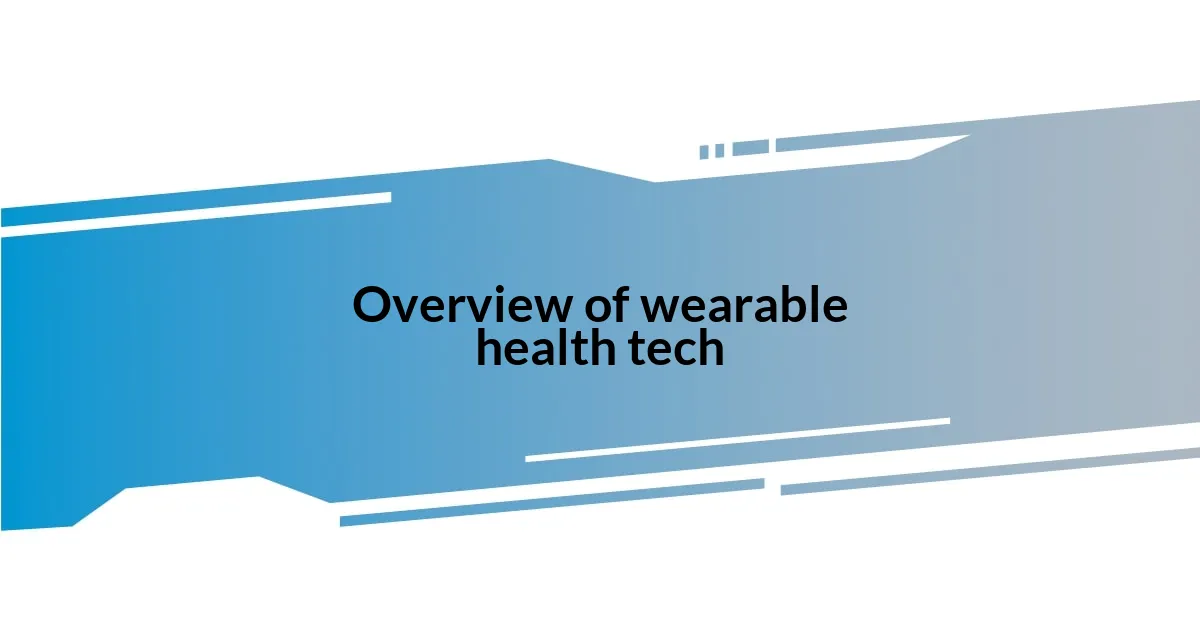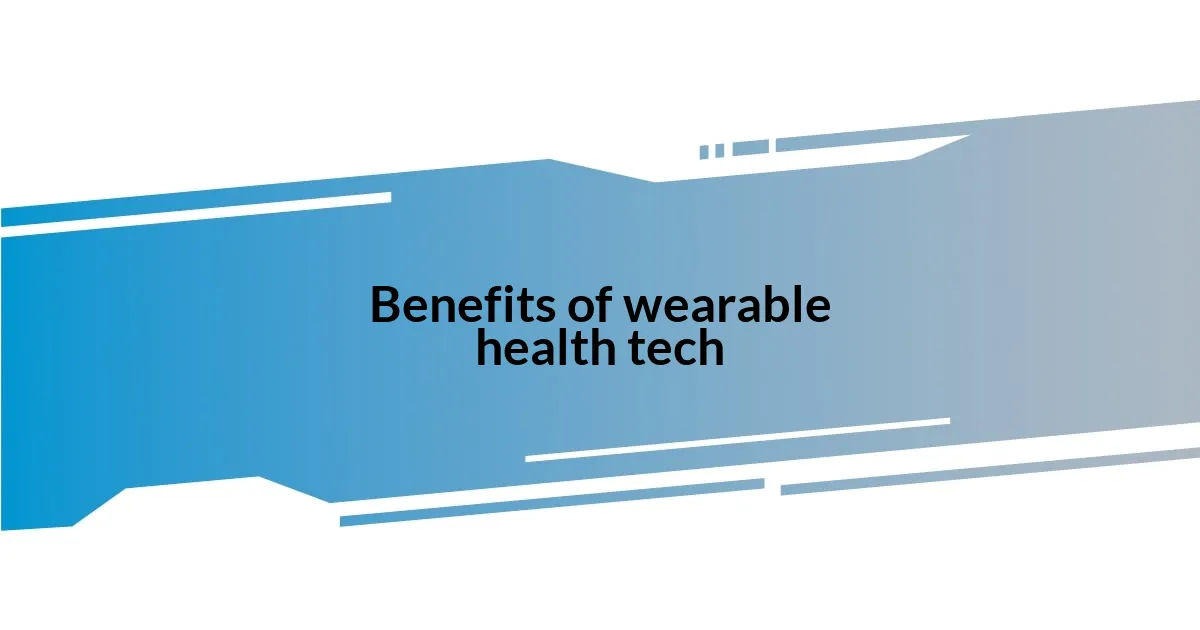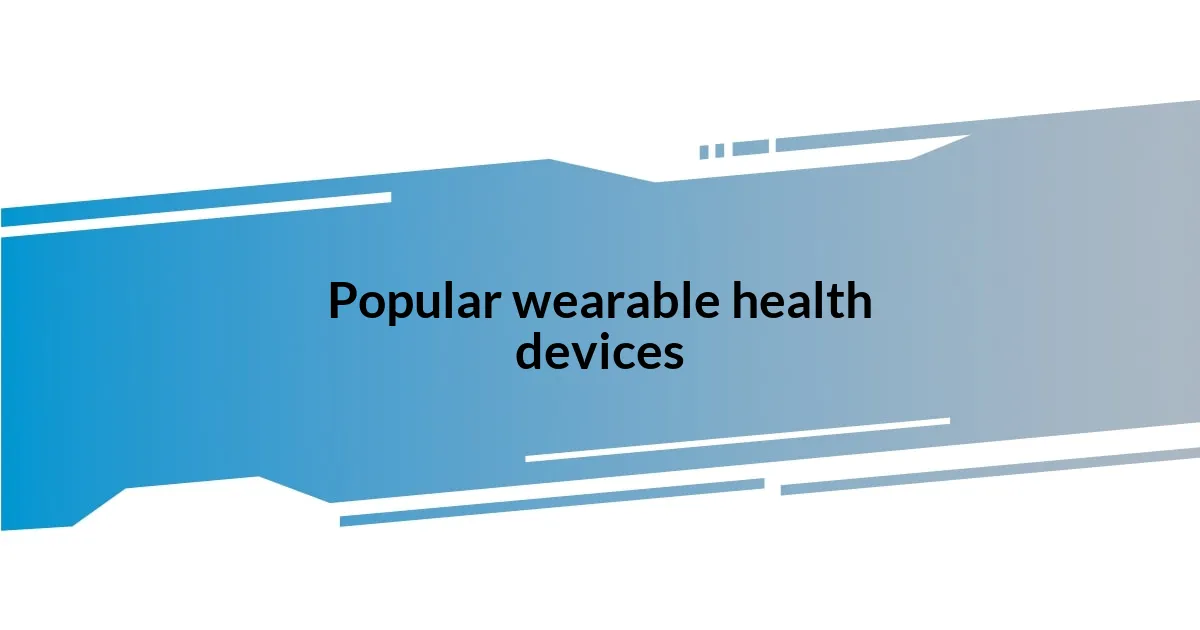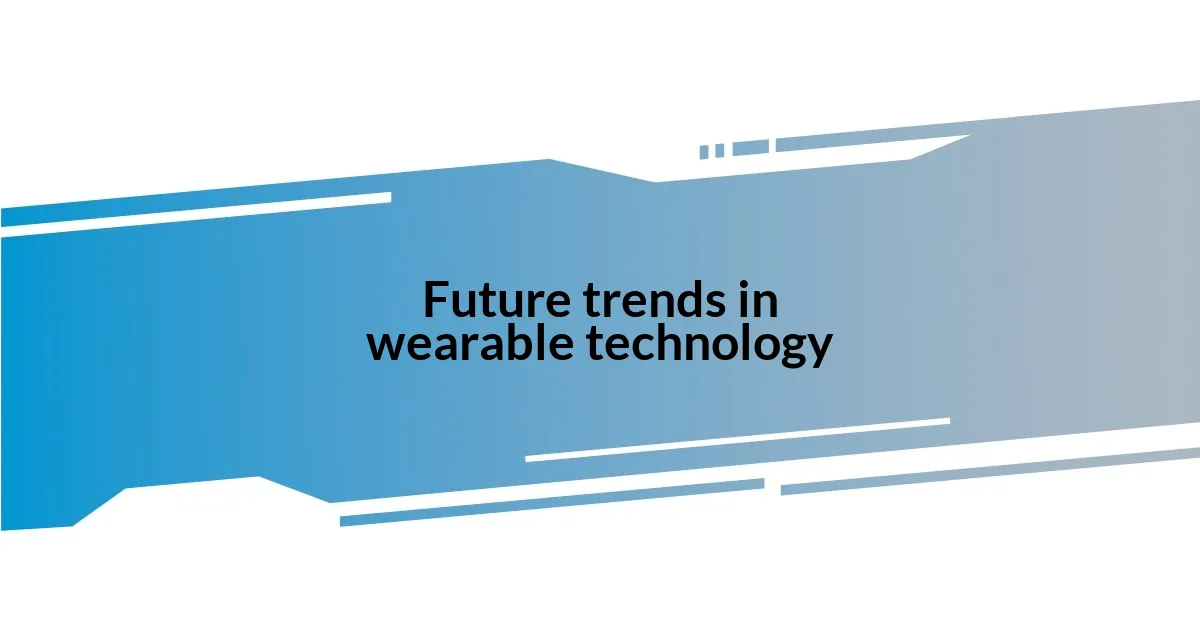Key takeaways:
- Wearable health tech enhances proactive health management by providing real-time data and encouraging users to be more aware of their bodily signals.
- The integration of wearable devices with health apps offers personalized fitness insights and a community aspect that fosters motivation and accountability.
- Future advancements include continuous health monitoring with AI capabilities, allowing for proactive adjustments in lifestyle and wellness management.
- Devices like smartwatches not only track physical metrics but also contribute to mental well-being by suggesting mindfulness practices based on user data.

Overview of wearable health tech
Wearable health technology encompasses a wide range of devices that monitor various aspects of our physical and mental well-being. From fitness trackers to smartwatches, these gadgets offer real-time data on heart rate, sleep patterns, and physical activity. Personally, I find it fascinating how easily I can access insights about my health, often in the palm of my hand, leading me to wonder: how did we manage without these tools?
One of the most remarkable features of wearable health tech is its ability to foster a proactive approach to health management. For instance, I remember when I first used a smartwatch that alerted me to irregular heartbeats; it was a bit unnerving but ultimately empowering. It made me realize the significance of being aware of my body and its signals—something I hadn’t truly considered before.
Moreover, I’ve noticed that the emotional connection we develop with these devices is profound. They act as personal wellness coaches, encouraging us to move more or take a moment to breathe. Have you ever felt that little nudge from your tracker to get up and stretch? It can turn a mundane moment into an opportunity for self-care, reminding us that our health is a continuous journey, not just a destination.

Benefits of wearable health tech
Embracing wearable health tech has truly transformed the way I manage my fitness goals. I once struggled to maintain my exercise routine, often letting distractions derail my plans. However, when I incorporated a fitness tracker into my daily life, it felt like having a personal coach on my wrist. Those gentle reminders to move throughout the day make a significant difference, nudging me toward a more active lifestyle.
Another significant benefit is the wealth of data these devices provide. I recall the first time I analyzed my sleep patterns through a sleep tracker. It was eye-opening to see how many hours of deep sleep I was actually getting versus light sleep. This insight helped me adjust my evening routine, which not only improved my energy levels but also my overall mood. Have you ever looked at stats and felt inspired to make changes based on what you see?
From my perspective, the community aspect of wearable health tech cannot be overlooked. Engaging with friends who also use fitness apps fosters a sense of accountability that I haven’t experienced before. Competing with friends to hit our daily step goals or sharing our progress on challenges makes exercising more enjoyable. It’s not just about the numbers; it’s about creating connections that motivate us to strive for better health together.
| Benefit | Description |
|---|---|
| Proactive Health Management | Encourages awareness of bodily signals, empowering users to take action. |
| Data Insights | Provides detailed analytics on sleep and activity, allowing for informed adjustments. |
| Community Support | Fosters connections with friends, enhancing motivation and accountability. |

Popular wearable health devices
When it comes to popular wearable health devices, there’s a vast array that catches my attention. I’ve experimented with different options, and every device offers something unique. For example, smartwatches like the Apple Watch and Fitbit seamlessly blend functionality with health tracking. I still remember the excitement of receiving my first fitness tracker; it felt like flipping a switch that illuminated my path to better health. Watching my step count rise each day sparked a thrill that motivated me to reach my daily goals.
Here are some widely recognized wearable health devices:
- Apple Watch: Tracks heart rate, ECG, and offers workout metrics while also integrating with apps.
- Fitbit: Known for its detailed activity tracking, sleep insights, and friendly competitions with friends.
- Garmin: Popular among outdoor enthusiasts for GPS tracking and performance analytics specific to various sports.
- Whoop Strap: Focuses on recovery, strain, and sleep optimization, providing in-depth metrics for personal training enhancement.
- Oura Ring: A sleek option for those who prefer a non-wrist device, offering comprehensive sleep and activity tracking.
These devices aren’t just about numbers; they have the power to change how we interact with our bodies. I remember when I first synced my watch to monitor my stress levels through breathing exercises. Feeling its gentle reminders to take a breath and recalibrate my mind often reminded me to pause in a hectic day. It’s fascinating how technology can become a lifeline to mindfulness and self-awareness, making each tiny milestone feel significant.

Integration with health apps
The integration of wearable health tech with health apps has genuinely enhanced my experience in managing my well-being. I remember the first time I connected my fitness tracker to an app that monitored my nutrition. It was like unlocking a treasure trove of data! Suddenly, I had an overview of my activities, diet, and recovery all in one place. This holistic view made me more accountable for my choices, transforming my approach from reactive to proactive.
One standout feature I’ve enjoyed is the seamless syncing of workouts and health metrics. I often engage in different activities, and having my app automatically log my runs or yoga sessions gives a satisfying sense of accomplishment. It sparks a question: Have you ever felt that rush of pride when you see your progress laid out visually? I still recall the feeling of hitting a new personal best and instantly sharing that achievement with friends through the app, fostering a sense of camaraderie that makes each step feel even more significant.
Moreover, the ability to receive personalized fitness suggestions from these integrated health apps is a game changer. As I noticed patterns in my data, such as a decline in energy during specific workouts, the app would offer tailored advice. One time, it suggested a change in my hydration routine that I never considered before. Implementing that small adjustment led to noticeable improvements in my resilience and recovery. It’s amazing how these insights, backed by data, can lead to impactful shifts in our health journeys. Have you ever thought about how powerful a little extra information can be?

Real-life impact on health
The real-life impact of wearable health tech on our health is profound and often surprising. I remember a period when I started using my smartwatch to monitor my heart rate during workouts. Initially, it felt like just another gadget, but over time, I realized how significantly it influenced my training intensity. I found myself pushing harder when I could see my heart rate climbing, turning every session into a focused endeavor. Have you ever noticed how numbers can push you to surpass your limits?
Beyond exercise, these devices have helped me become more in tune with my body’s rhythms. I’ll never forget the first time my sleep tracker revealed how restless I had been at night. It was eye-opening! Armed with this knowledge, I adjusted my bedtime routine, prioritizing mindfulness practices that calmed my mind. It’s incredible how just one insightful data point can steer our habits in healthier directions. Have you experienced a similar revelation from your health data?
Moreover, the community aspect of wearable health tech shouldn’t be underestimated. Engaging with friends through challenges and tracking each other’s achievements truly fosters a sense of camaraderie. I vividly recall participating in a step challenge. The friendly competition pushed me to take those extra evening walks, making exercise feel less like a chore and more like a shared adventure. How often do we forget that motivation thrives in community? That boost from seeing others succeed can be just what we need to keep moving forward.

Future trends in wearable technology
The future of wearable technology is bright and brimming with possibilities. I’ve been noticing a trend towards more advanced health monitoring features, like continuous glucose monitoring for those managing diabetes. Just the thought of having real-time insights on blood sugar levels through a simple wearable device excites me! Have you ever imagined what your daily life would feel like if you could receive alerts before a dip in your blood sugar?
Another fascinating development is the growing integration of artificial intelligence in wearables. I recently experimented with a smartwatch that could analyze my stress levels throughout the day and suggest personalized breathing exercises. The first time it nudged me gently to take a break and breathe, I was amazed at how much my anxiety dropped. This proactive approach made me wonder: how would our daily interactions change if wellness tech could anticipate our needs before we even recognized them?
As wearables become more versatile, I see a future where they not only track our health but also focus on preventive care. I can envision a scenario where my device alerts me about potential health issues before I even visit a doctor, creating a partnership in staying healthy. Wouldn’t it be empowering to feel in control of our well-being in such an informed way? The prospect of wearables guiding us on lifestyle choices based on real-time data is truly exhilarating, and I can’t wait to see how this will unfold.